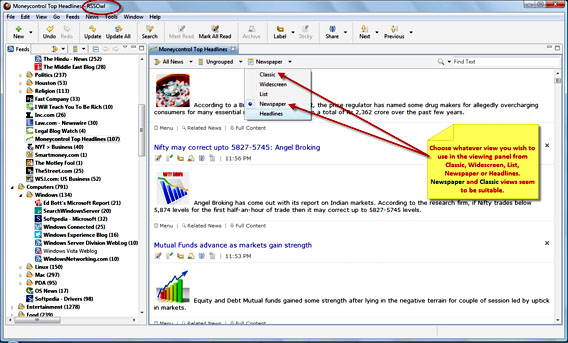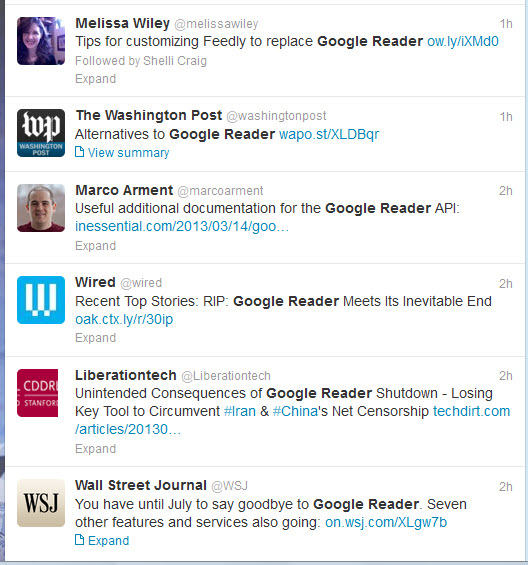
[HOME ] [ABOUT] [PHOTOS] [VIDEO] [BLOG] [HOUSTON] [TEXAS] [U.S. NEWS] [WORLD NEWS] [SPORTS] [POP CULTURE] [CONTACT]
Google to shut down Googel Reader--Web users enraged

RSSOwl shown above, is so far the best alternative to Google Reader, according to Newscast Media.
by Joseph Earnest March 15, 2013
Newscast Media SAN JOSE, Calif—In a move that stunned Web users, Google announced this week, that it would be discontinuing its free Google Reader service that many use to read RSS (Real Simple Syndication) feeds. The service will be discontinued on July 1. Google is trying very hard to bury the news, and this has prompted users to sign a petition in order to save the popular RSS Reader. As of this writing, the petition has almost 100K signatures.
"We launched Google Reader in 2005 in an effort to make it easy for people to discover and keep tabs on their favorite websites," Google said. "While the product has a loyal following, over the years usage has declined. So, on July 1, 2013, we will retire Google Reader."
There are of course are alternatives to Google Reader. I personally use RSSOwl as shown in the screenshot above. You may view the full screen of RSSOwl here. (pop-up)
*(If you use Google Reader, you will have to export your feeds, and upload the XML file into RSSOwl. Google will export all feeds as a zip-file, from which you will be able to extract the XML file to be loaded into the RSS reader of your choice.)
RSSOwl is a stand-alone free RSS reader that can be installed on a PC, and actually is very user-friendly and perhaps even better than Google Reader. It's source code is hosted by SourceForge. You may test-drive the free RSSOwl here. (pop-up)
There are also more services other than RSSOwl like FeedDemon which is considered the best, but I just don't like the word "Demon" on my computer, since it installs an image of a demon as the icon of the program. FeedReader is another good one, Netvibes, Feedly, Newsblur, Tiny Tiny RSS, Newsbeuter and many others. These can all be Googled to find what's best for you.
This should be a stern warning for those who heavily depend on free Web services, to wean themselves and use stand-alone, dependable services that they have more control over. It is the reason we don't use "Disqus" for the comments section.
There are many who, for example, rely entirely on social networks to build audiences and neglect to build their own personal Web sites. Remember, the more content one puts on a social network, the more one helps it grow. Why not spend that time and energy into building Web pages of one's personal Web site?
The genius about social networks, is that one only has to know how to write code, which virtually anyone over the age of 13 can do—then upload self-replicating pages, host them on a giant server, convince investors to pump millions of dollars into the venture, then invite users to upload their photos, music, videos and so forth. It is the Web users who unknowingly build social networks by uploading content. If 100,000 users upload 10 photos each, they just helped build 1,000,000 new pages. As more content is uploaded, the social network self-replicates and expands, and the originator of the idea is viewed as a massive genius.
Think about a social network as your blog where you invite people to post their content, as long as they abide by the terms of service. If you can convince investors to sow "seed money" into your project and give them a percentage of your creation, you're in business. If you cannot raise the money, you're on vacation.
In the third world, they are always raving about creators of social networks, and almost nearly worship them. What these so-called writers do not understand is that people like Mark Zuckerberg are fortunate to have had a company like Microsoft invest over $240 million of seed money in Facebook. It is the Web Developers who write the code, who you never hear of, that built the framework upon which Facebook rose to pre-eminence. Zuckerberg simply was able to use his connections to get the attention of the world's richest man at the time, and now he only owns a small percentage of the social network. He (Zuckerberg) was the front man, if you will, that's why he is constantly being sued by his formers partners, for taking their ideas and not giving them credit.
Likewise, everybody knows the U.S. government invested "seed money" in Google that's why they have access to satellite maps and views that nobody else can access. Twitter is still figuring out how to turn a profit, and Amazon.com which started in 1999, turned its first profit in 2002, three years after its genesis. YouTube at its inception was bought by Google (the government) and is perhaps the most effective multimedia social network. All these IT companies had investors drop millions of dollars into their projects, before they became prominent.
There are many people with ideas, who just don't have access to angel investors. Only the well-connected, and those willing to give up a substantial percentage of their concepts, and also relinquish most of the editorial control of content, are able to fund their ventures through third parties. You see that a lot during election season, when social networks threaten to shut down users' accounts because they may disagree politically with the author of the work. It is actually the investors who pressure the operators of the social networks to take such action.
The ethnic origin of the creator also matters. A person in sub-Saharan Africa would find it harder to get an investor to support a project due to the rampant corruption in the region, or a person in Afghanistan, out of fear that there will be no Return On Investment (ROI), as opposed to someone living in Manhattan's financial district, with solid references that one can actually pick up the phone and talk to.
An option to bypassing investors who would take a big chunk of the company, is to self-fund one's project, and build it slowly and organically, but retain 100 percent of the ownership. This takes time because money has to be raised individually, and many sacrifices have to be made.
Overall, those who retain creative control end up winners, even though the results may not be as immediate as those who have big budgets, because the person who self-funds, does it as a labor of love, and is not bound by limitations that advertisers, investors or sponsors may impose upon the venture. Add Comments>>
Below is some of the reaction of Web users regarding the demise of Google Reader:

|
|
Join the Newscast Media social networks
for current events and multimedia content.
|
|
Copyright© Newscast Media. All Rights Reserved. Terms and Privacy Policy
